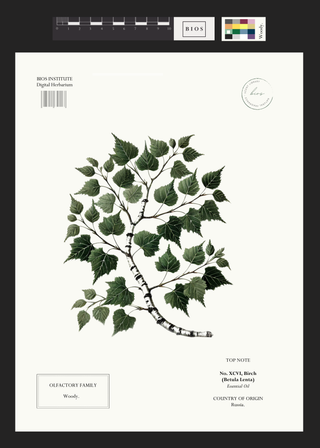

Birch (Betula Lenta) Steam-distilled birch oil, derived from the bark of the tree,, is another form of birch used in perfumery. Betula lenta, commonly known as black birch or sweet birch, is native to eastern North America. Its native range includes regions such as the northeastern and north-central United States, including states like Maine, New Hampshire, Vermont, New York, Pennsylvania, and parts of the Appalachian Mountains, along with eastern Canada, including regions such as Nova Scotia, New Brunswick, Quebec, Ontario, and parts of the eastern provinces. Unlike birch tar, which is obtained through dry distillation of the bark, steam-distilled birch oil has a different aroma profile.
The essential oil extracted from Betula lenta has a distinctive sweet, spicy, and slightly medicinal aroma. It contains methyl salicylate, which contributes to its characteristic scent. The fragrance profile of black birch oil is often described as reminiscent of wintergreen or root beer.
In perfumery, Birch is a bright, yet warm top note found in our Woody family. It adds freshness and spice to fragrance compositions.
Black birch oil blends well with other woody and spicy notes. It can contribute to creating warm and complex accords in perfumes. It pairs well with ingredients such as cedarwood, sandalwood, patchouli, and various spices. Black birch oil is often used in natural and artisanal perfume formulations. Its unique scent can add character and intrigue to fragrances seeking a nostalgic, outdoorsy, or vintage vibe. Obtaining black birch essential oil can be challenging as it is not as readily available as other essential oils. Extraction of the oil from the bark requires specific expertise.
In Native American traditions, birch trees are highly revered and considered sacred. They are often associated with healing and purification rituals. Birch bark is used in various ceremonial practices, such as creating baskets, canoes, and containers for food and medicine. The white bark of the birch tree is also used for decorative purposes and in storytelling.
In European folklore, birch trees are associated with protection, fertility, and purification. Birch twigs or branches are commonly used in rituals to drive away evil spirits or to symbolize new beginnings. In some cultures, birch is considered a tree of love and is associated with weddings and fertility rites.
Birch trees hold a special place in Scandinavian culture. In Nordic mythology, the birch is considered the tree of the goddess Frigg, associated with beauty, protection, and love. It is also believed to have protective qualities against negative energies and is used in traditional Scandinavian rituals and celebrations.
In Slavic folklore, birch trees are associated with femininity, birth, and renewal. The birch tree is seen as a symbol of the Slavic goddess of fertility and spring, Berehynia. Birch branches and leaves are used in rituals and celebrations, such as the Midsummer festival, to bring good fortune and ward off evil spirits.
In Siberian shamanism, birch trees are regarded as a sacred connection between the earthly and spiritual realms. The birch is seen as a conduit for communication with spirits and is used in shamanic rituals and practices.
Birch
- Unit price
- /per
Please note this product format is a small vial that contains roughly 20 drops of scent concentrate. This can be purchased à la carte but is intended to be used with our Perfume Kit.
SCENT SPECIFICATIONS
Latin Name: Betula Lenta
Extraction Method: Steam Distilled
Country of Origin: Russia
All of the scents in our library our naturally derived - our collection includes essential oils, absolutes, concretes, isolates, enfleurage, macerations, oleoresins, and mixed medium naturals.
Adding product to your cart
Birch (Betula Lenta) Steam-distilled birch oil, derived from the bark of the tree,, is another form of birch used in perfumery. Betula lenta, commonly known as black birch or sweet birch, is native to eastern North America. Its native range includes regions such as the northeastern and north-central United States, including states like Maine, New Hampshire, Vermont, New York, Pennsylvania, and parts of the Appalachian Mountains, along with eastern Canada, including regions such as Nova Scotia, New Brunswick, Quebec, Ontario, and parts of the eastern provinces. Unlike birch tar, which is obtained through dry distillation of the bark, steam-distilled birch oil has a different aroma profile.
The essential oil extracted from Betula lenta has a distinctive sweet, spicy, and slightly medicinal aroma. It contains methyl salicylate, which contributes to its characteristic scent. The fragrance profile of black birch oil is often described as reminiscent of wintergreen or root beer.
In perfumery, Birch is a bright, yet warm top note found in our Woody family. It adds freshness and spice to fragrance compositions.
Black birch oil blends well with other woody and spicy notes. It can contribute to creating warm and complex accords in perfumes. It pairs well with ingredients such as cedarwood, sandalwood, patchouli, and various spices. Black birch oil is often used in natural and artisanal perfume formulations. Its unique scent can add character and intrigue to fragrances seeking a nostalgic, outdoorsy, or vintage vibe. Obtaining black birch essential oil can be challenging as it is not as readily available as other essential oils. Extraction of the oil from the bark requires specific expertise.
In Native American traditions, birch trees are highly revered and considered sacred. They are often associated with healing and purification rituals. Birch bark is used in various ceremonial practices, such as creating baskets, canoes, and containers for food and medicine. The white bark of the birch tree is also used for decorative purposes and in storytelling.
In European folklore, birch trees are associated with protection, fertility, and purification. Birch twigs or branches are commonly used in rituals to drive away evil spirits or to symbolize new beginnings. In some cultures, birch is considered a tree of love and is associated with weddings and fertility rites.
Birch trees hold a special place in Scandinavian culture. In Nordic mythology, the birch is considered the tree of the goddess Frigg, associated with beauty, protection, and love. It is also believed to have protective qualities against negative energies and is used in traditional Scandinavian rituals and celebrations.
In Slavic folklore, birch trees are associated with femininity, birth, and renewal. The birch tree is seen as a symbol of the Slavic goddess of fertility and spring, Berehynia. Birch branches and leaves are used in rituals and celebrations, such as the Midsummer festival, to bring good fortune and ward off evil spirits.
In Siberian shamanism, birch trees are regarded as a sacred connection between the earthly and spiritual realms. The birch is seen as a conduit for communication with spirits and is used in shamanic rituals and practices.
